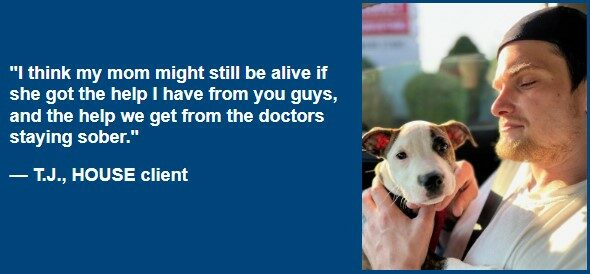In these last days of the current Maine legislative session, we have a final opportunity to push for funding for two critical bills that would support people experiencing unsheltered homelessness and substance use disorder.
- LD1781: An Act to Establish the Homeless Substance Use Disorder Service Program Rooted in harm reduction and low-barrier access principles, the 2-year Homeless Opioid User Service Engagement (H.O.U.S.E) pilot program served the needs of Portland’s most vulnerable neighbors who are experiencing both homelessness and acute substance use disorder (SUD). LD 1781 will broaden the scope of this innovative and lifesaving program, keeping people housed and in recovery.
- LD599: An Act to Provide Support Services for a Transitional Housing Program for Homeless Persons This bill will support Preble Street’s Elena’s Way Wellness Shelter in its operational costs.
Individual legislative committees are currently compiling their lists of 10 priority bills to send to the Committee on Appropriations and Financial Affairs, who impact whether each bill gets funded.
Please ask the members of the Health and Human Services Committee to include LD1781 and LD599 in their
list of priorities!
Email addresses for committee members are listed below, along with information about why these bills are so crucial.
HHS Committee member emails
Joe.Baldacci@legislature.maine.gov
Henry.Ingwersen@legislature.maine.gov
Marianne.Moore@legislature.maine.gov
Michele.Meyer@legislature.maine.gov
Margaret.Craven@legislature.maine.gov
AnnMarie.Fredericks@legislature.maine.gov
apg1@maine.rr.com
Abigail.Griffin@legislature.maine.gov
Kathy.Javner@legislature.maine.gov
Michael.Lemelin@legislature.maine.gov
Colleen.Madigan@legislature.maine.gov
Daniel.Shagoury@legislature.maine.gov
Sam.Zager@legislature.maine.gov
WHY is LD1781 so important?
- Many existing resources and systems are not grounded in harm reduction or centered around low-barrier access and as a result, are systematically excluding individuals with acute SUD.
- The H.O.U.S.E. pilot project, a collaboration between Preble Street and Greater Portland Health and funded by the state of Maine, launched in 2021. The program mainly targets unsheltered individuals with opioid use disorder, as they face a high risk of fatality.
- The initial pilot project has been extremely successful serving 49 people, connecting 100% of participants to Medication Assisted Treatment (MAT) & Mental/Medical Health Treatment, and housing 27 individuals.
- It will broaden the scope of the initial pilot to ensure that the program will be available in at least one rural and one urban area, as well as include other forms of substance use disorders and provide funding for transportation, community resources, and inpatient treatment services.
- Housing is a critical component of substance use disorder treatment as the trauma of homelessness complicates people’s ability to engage in treatment and can trigger substance misuse and relapse.
WHY is LD599 so important?
- A Wellness Shelter is a 24-hour, service-inclusive, and trauma-informed emergency shelter for individuals experiencing homelessness that is grounded in social work and medical best practices.
- Elena’s Way serves people experiencing chronic homelessness, who are often not feasible candidates for other forms of shelter. Almost all of the shelter residents have a documented co-occurring substance use disorder or mental health issues and the low-barrier, trauma-informed approach provides a safe environment in which they can access shelter. For example:
- 100% of clients were unsheltered prior to admission
- 100% of clients are restricted from or unable to consistently access other area shelters
- 97% of clients have a mental health diagnosis and 79% have a cooccurring Substance Use Disorder.
- In the nine months since the shelter has opened, we have witnessed the transformative impact of this thoughtfully designed, trauma-informed shelter on some of the most vulnerable members of our community.
- Individuals accessing Elena’s Way have significantly reduced engagement with law enforcement and emergency personnel, proving that this shelter is a cost-saving measure for the community, and a mooring of stability and support for clients who stay there.
